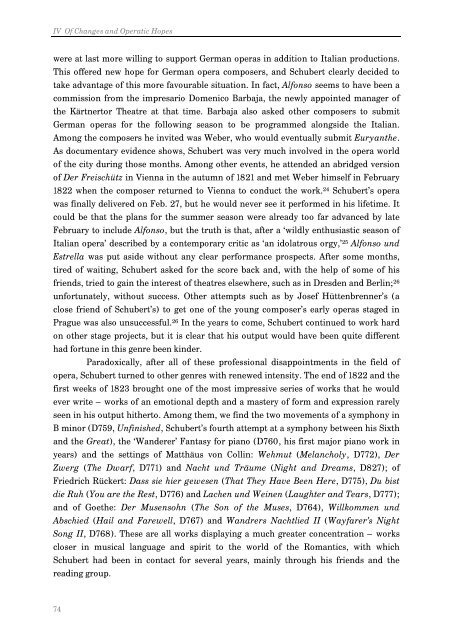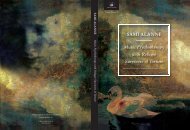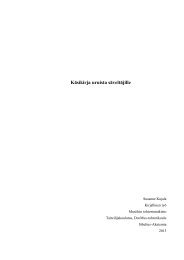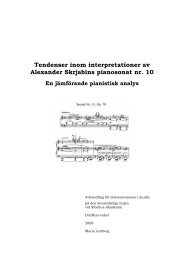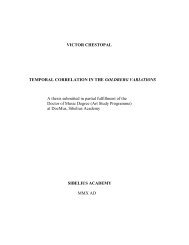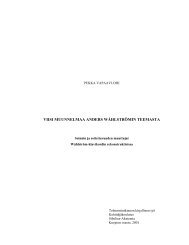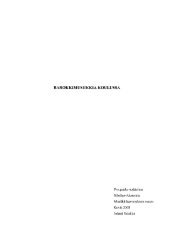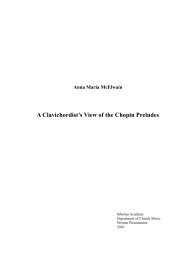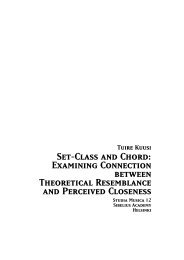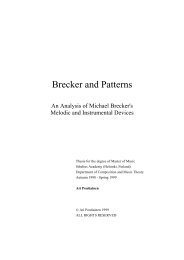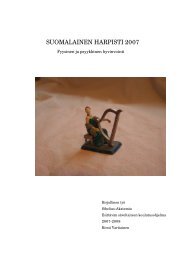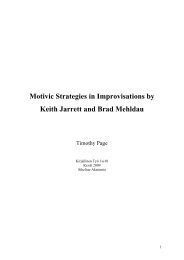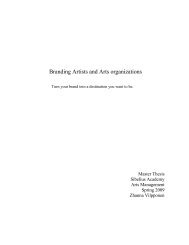The Unfinished Piano Sonatas of Franz Schubert Javier ... - Ethesis
The Unfinished Piano Sonatas of Franz Schubert Javier ... - Ethesis
The Unfinished Piano Sonatas of Franz Schubert Javier ... - Ethesis
Create successful ePaper yourself
Turn your PDF publications into a flip-book with our unique Google optimized e-Paper software.
IV Of Changes and Operatic Hopes<br />
were at last more willing to support German operas in addition to Italian productions.<br />
This <strong>of</strong>fered new hope for German opera composers, and <strong>Schubert</strong> clearly decided to<br />
take advantage <strong>of</strong> this more favourable situation. In fact, Alfonso seems to have been a<br />
commission from the impresario Domenico Barbaja, the newly appointed manager <strong>of</strong><br />
the Kärtnertor <strong>The</strong>atre at that time. Barbaja also asked other composers to submit<br />
German operas for the following season to be programmed alongside the Italian.<br />
Among the composers he invited was Weber, who would eventually submit Euryanthe.<br />
As documentary evidence shows, <strong>Schubert</strong> was very much involved in the opera world<br />
<strong>of</strong> the city during those months. Among other events, he attended an abridged version<br />
<strong>of</strong> Der Freischütz in Vienna in the autumn <strong>of</strong> 1821 and met Weber himself in February<br />
1822 when the composer returned to Vienna to conduct the work. 24 <strong>Schubert</strong>’s opera<br />
was finally delivered on Feb. 27, but he would never see it performed in his lifetime. It<br />
could be that the plans for the summer season were already too far advanced by late<br />
February to include Alfonso, but the truth is that, after a ‘wildly enthusiastic season <strong>of</strong><br />
Italian opera’ described by a contemporary critic as ‘an idolatrous orgy,’ 25 Alfonso und<br />
Estrella was put aside without any clear performance prospects. After some months,<br />
tired <strong>of</strong> waiting, <strong>Schubert</strong> asked for the score back and, with the help <strong>of</strong> some <strong>of</strong> his<br />
friends, tried to gain the interest <strong>of</strong> theatres elsewhere, such as in Dresden and Berlin; 26<br />
unfortunately, without success. Other attempts such as by Josef Hüttenbrenner’s (a<br />
close friend <strong>of</strong> <strong>Schubert</strong>’s) to get one <strong>of</strong> the young composer’s early operas staged in<br />
Prague was also unsuccessful. 26 In the years to come, <strong>Schubert</strong> continued to work hard<br />
on other stage projects, but it is clear that his output would have been quite different<br />
had fortune in this genre been kinder.<br />
Paradoxically, after all <strong>of</strong> these pr<strong>of</strong>essional disappointments in the field <strong>of</strong><br />
opera, <strong>Schubert</strong> turned to other genres with renewed intensity. <strong>The</strong> end <strong>of</strong> 1822 and the<br />
first weeks <strong>of</strong> 1823 brought one <strong>of</strong> the most impressive series <strong>of</strong> works that he would<br />
ever write – works <strong>of</strong> an emotional depth and a mastery <strong>of</strong> form and expression rarely<br />
seen in his output hitherto. Among them, we find the two movements <strong>of</strong> a symphony in<br />
B minor (D759, <strong>Unfinished</strong>, <strong>Schubert</strong>’s fourth attempt at a symphony between his Sixth<br />
and the Great), the ‘Wanderer’ Fantasy for piano (D760, his first major piano work in<br />
years) and the settings <strong>of</strong> Matthäus von Collin: Wehmut (Melancholy, D772), Der<br />
Zwerg (<strong>The</strong> Dwarf, D771) and Nacht und Träume (Night and Dreams, D827); <strong>of</strong><br />
Friedrich Rückert: Dass sie hier gewesen (That <strong>The</strong>y Have Been Here, D775), Du bist<br />
die Ruh (You are the Rest, D776) and Lachen und Weinen (Laughter and Tears, D777);<br />
and <strong>of</strong> Goethe: Der Musensohn (<strong>The</strong> Son <strong>of</strong> the Muses, D764), Willkommen und<br />
Abschied (Hail and Farewell, D767) and Wandrers Nachtlied II (Wayfarer’s Night<br />
Song II, D768). <strong>The</strong>se are all works displaying a much greater concentration – works<br />
closer in musical language and spirit to the world <strong>of</strong> the Romantics, with which<br />
<strong>Schubert</strong> had been in contact for several years, mainly through his friends and the<br />
reading group.<br />
74


